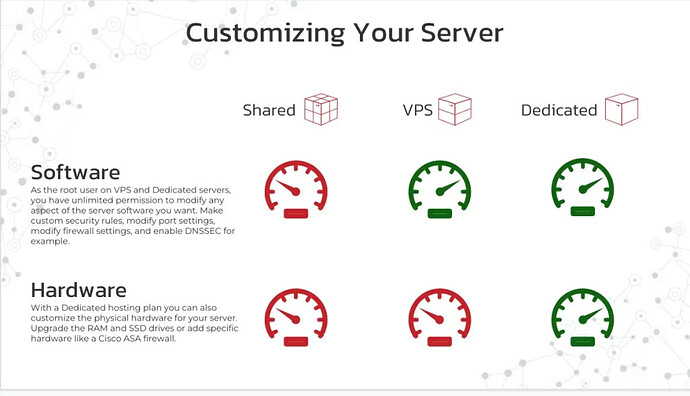Choosing the right hosting solution for your website is crucial for its performance, security, and scalability. Understanding the differences between shared, VPS (Virtual Private Server), and dedicated hosting can help you make an informed decision that best suits your needs. Here’s a breakdown of each type of hosting, their pros and cons, and when to choose each option.
1. Shared Hosting
What It Is:
Shared hosting is a type of web hosting where multiple websites share the same server and its resources, such as CPU, memory, and disk space. It’s akin to living in a shared apartment where all residents share the same facilities.
Pros:
- Cost-Effective: Shared hosting is generally the most affordable option, making it ideal for beginners, small businesses, and personal websites.
- Easy to Manage: Hosting providers usually handle server maintenance, updates, and security, making it a hassle-free option for users with limited technical knowledge.
- User-Friendly: Shared hosting plans often come with easy-to-use control panels (e.g., cPanel) that simplify website management tasks.
Cons:
- Limited Resources: Since you’re sharing resources with other websites, high traffic on one site can affect the performance of others.
- Less Control: You have limited access to server configurations, which might restrict some advanced functionalities.
- Security Risks: Sharing a server with other websites increases the risk of security vulnerabilities, especially if other sites are not properly secured.
When to Choose Shared Hosting:
Shared hosting is ideal for personal blogs, small business websites, and other low-traffic sites that don’t require extensive resources or custom server configurations.
2. VPS Hosting (Virtual Private Server)
What It Is:
VPS hosting provides a virtualized server environment within a physical server. Although the physical server is shared among multiple users, each VPS operates independently with its dedicated resources.
Pros:
- Dedicated Resources: VPS hosting allocates specific resources (CPU, RAM, disk space) to each user, ensuring better performance and stability.
- Scalability: You can easily upgrade your resources as your website grows, making VPS hosting a scalable option.
- More Control: VPS offers greater control over server settings, configurations, and the installation of custom software.
- Improved Security: Since each VPS is isolated, your site is less likely to be affected by other users’ activities on the same server.
Cons:
- Higher Cost: VPS hosting is more expensive than shared hosting, although it remains more affordable than dedicated hosting.
- Technical Knowledge Required: Managing a VPS may require a basic understanding of server management and maintenance.
- Resource Limits: While VPS hosting provides more resources than shared hosting, it’s still limited compared to dedicated servers.
When to Choose VPS Hosting:
VPS hosting is suitable for medium-sized businesses, growing websites, e-commerce sites, and applications that need more control and resources than shared hosting can offer but don’t yet require a dedicated server.
3. Dedicated Hosting
What It Is:
Dedicated hosting provides an entire physical server exclusively for your website. This means you have full control over all server resources and configurations.
Pros:
- Maximum Performance: Since all resources are dedicated to your site, dedicated hosting offers the best performance, speed, and reliability.
- Full Control: You have complete access to the server environment, allowing for extensive customization and configuration.
- Enhanced Security: With a dedicated server, you have complete control over security settings, which is crucial for handling sensitive data or high-traffic applications.
- No Resource Sharing: Your website won’t be affected by other users, ensuring consistent performance.
Cons:
- High Cost: Dedicated hosting is the most expensive option due to the exclusive use of server resources.
- Requires Technical Expertise: Managing a dedicated server often requires advanced technical skills for server setup, maintenance, and troubleshooting.
- Overkill for Small Sites: For small websites with low traffic, dedicated hosting may be more than what’s needed and could lead to unnecessary costs.
When to Choose Dedicated Hosting:
Dedicated hosting is ideal for large enterprises, high-traffic websites, resource-intensive applications, or websites that require stringent security measures. It’s also suitable for businesses that need full control over their server environment.
Conclusion
Selecting the right hosting option depends on your website’s specific needs, budget, and technical requirements. Here’s a quick summary to help you decide:
- Shared Hosting: Best for small websites, blogs, and startups with limited budgets and low traffic.
- VPS Hosting: Suitable for growing websites, medium-sized businesses, and those needing more control, performance, and scalability.
- Dedicated Hosting: Ideal for large, high-traffic websites, enterprises, or applications requiring maximum performance, security, and customization.
By understanding the differences between shared, VPS, and dedicated hosting, you can make a more informed decision that aligns with your website’s current needs and future growth plans.
